Intel CPUs continue to lead the market in terms of total share, thanks to their long-standing reputation and legacy of chips that appeal to PC users and gamers. Recently, AMD has caught up and captured a significant slice, but Team Blue continues to retain the performance crown.
This also comes amid Intel's biggest marketing shift in the last 15 years: the Core i3, i5, and i7 chips are now replaced with the new Core and Core Ultra 3, 5, and 7 chips. These new chips are more capable and better named to not confuse buyers as much.
We've listed all the major Intel processors that demand your attention while purchasing a new gaming chip in early 2025. Note that Intel launches dozens of processors every year, covering all of them in one article isn't possible. We might've missed some honorable mentions that could be the best chip for niche users.
Note: Parts of this article are based on the author's opinion.
Intel CPUs can be superb for gaming and multitasking
5) Intel Core i5-14400F ($154)
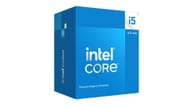
The Core i5-14400F continues to be the most popular Intel CPU, given its careful balance of features and pricing. Moreover, it is based on the older Rocket Lake Refresh architecture, which helps cut costs in motherboards and cooling hardware. The chip supports both DDR5 and DDR4 memory, giving gamers a choice between tighter pricing or improved performance and future-proofing.
In terms of on-paper specs, the processor is powered by 10 cores, six of which are high-performance "P" cores and the rest are efficient "E" cores. This is the second budget i5 with a hybrid core architecture, allowing smoother multitasking experiences and efficiency.
On top of this, the affordable $154 makes it a better deal than what AMD has to offer. However, the cheaper "F" variant won't have an iGPU and a discrete graphics card is mandated.
Pros:
- Affordable for budget builds, with great performance for everyday tasks.
- 10 cores provide smooth multitasking without breaking the bank.
- Lower TDP ensures cooler and quieter operation under load.
Cons:
- No integrated GPU, mandating a separate graphics card.
- Limited overclocking capabilities for enthusiasts.
- Performance cores have a lower base clock compared to pricier options.
4) Intel Core i5-14600K ($239)
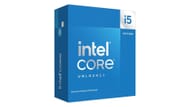
The Intel Core i5-14600K is the slightly more capable sibling of the 14400F listed above. Following the launch of the newer Arrow Lake processors, this 14th gen chip has been discounted to just $239-249 these days, making it the best choice in the sub-$300 range.
Under the hood, this Intel CPU is powered by 14 cores, six of which are "P" rated and eight rated "E." This improves performance in multitasking and CPU-heavy workloads such as file compression. The higher IPC also translates to better single-performance; however, compared to the 14400F, gains in video games in terms of framerates aren't much.
Pros:
- Excellent gaming performance with a strong single-core boost clock.
- The unlocked multiplier allows for easy overclocking potential.
- Balanced 14-core design handles gaming and productivity equally well.
Cons:
- You need to spend heavily on cooling hardware.
- Bit costlier than other i5 options.
- No significant IPC gains over its predecessor, the 13600K.
3) Intel Core i7-14700 ($329)
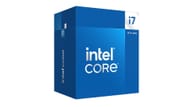
The Core i7-14700 is another last-generation Intel CPU that has been handsomely discounted. It is selling for around $330 these days, presenting crazy value for the single and multi-core performance metrics it can pump out. The chip is also based on the older LGA1700 platform, for which motherboards are cheaper. Theoretically, it supports both DDR4 and DDR5 memory, but we don't recommend opting for the earlier given the chip's caliber.
In terms of on-paper specs, you get a total of 20 cores with the 14700, eight of which are high-performance. The chip slightly cuts down on operating clock speeds to hit a power budget of 65W, which means spending a premium on cooling hardware and power supplies isn't necessary. Given the whole package, this processor is perfect for budget-conscious gamers looking for top-tier performance.
Pros:
- 20 cores make it ideal for heavy multitasking and high-end gaming.
- The chip packs a high boost clock for demanding workloads like rendering.
- Works with existing LGA 1700 motherboards, avoiding costly upgrades.
Cons:
- No overclocking features on the 14700.
- TDP spikes beyond 65W under sustained load.
- Performance gain over the 14400 and 14600K may be overkill for casual users.
2) Intel Core Ultra 7 265K ($377)
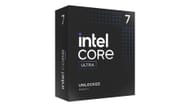
Coming to more of the latest Intel CPU launched, the Core Ultra 7 265K can be the option for high-end gamers looking to pair their system with an RTX 4070 Ti Super or 4080 GPU. The chip has been designed particularly to handle such high-performance components with ease, thereby facilitating a well-rounded system. These days, you can pick up the 265K chip for just under $400, making it cheaper than AMD's 9800X3D.
In terms of the underlying hardware, this Intel CPU offers 20 cores, arranged in a similar 8P+12E fashion as the 14700. However, the improved architecture translates to a 7%-10% improvement in performance over the 14700K, which would be particularly helpful if you're on a powerful GPU.
Pros:
- Advanced AI engine enhances tasks like image recognition and video editing.
- High boost clock keeps gaming performance competitive.
- Future-proofed with new architecture and DDR5 support.
Cons:
- Requires a new LGA 1851 motherboard, increasing build costs.
- No huge improvement in gaming over older Core i7s.
- Early adoption may mean pricier components.
1) Intel Core Ultra 9 285K ($589)
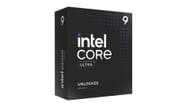
The Core Ultra 9 285K is this generation's flagship 24-core offering. This Intel CPU is filled to the brim with hardware for both traditional computing and AI, making it one of the best options if you have the cash. The chip is priced at an eye-watering $589 and could sell for more than that in some stores.
In terms of the underlying hardware, the chip is powered by eight "P" and 16 "E" cores. It boosts to a whopping 6 GHz under peak load. Although the advertised power budget is 150W, it frequently exceeds that number when stressed enough. This means you'll have to spend generously on a decent power supply and a capable liquid cooler.
Pros:
- 6.0 GHz boost clock—an absolute powerhouse for high-performance gaming.
- 24 cores make heavy multitasking and CPU-heavy tasks a breeze.
- With PCIe 5.0 support, AI features, and its flagship hardware, this Intel CPU is future-proof.
Cons:
- The very high 150W+ power draw requires a top-tier cooling system.
- The $589 price makes it prohibitively expensive for some.
- Few applications utilize all of the 24 cores at once.
Overall, these Intel CPUs are some of your best bets for building your next gaming. All of them offer some of the best single-core performance metrics, with the Core Ultra 9 285K currently owning the crown for the fastest chip. We have listed a variety of options from varying price points, so choose your pick based on your budget.
